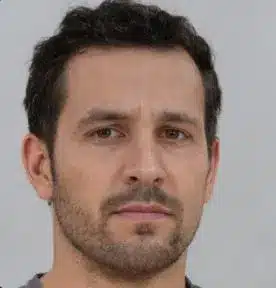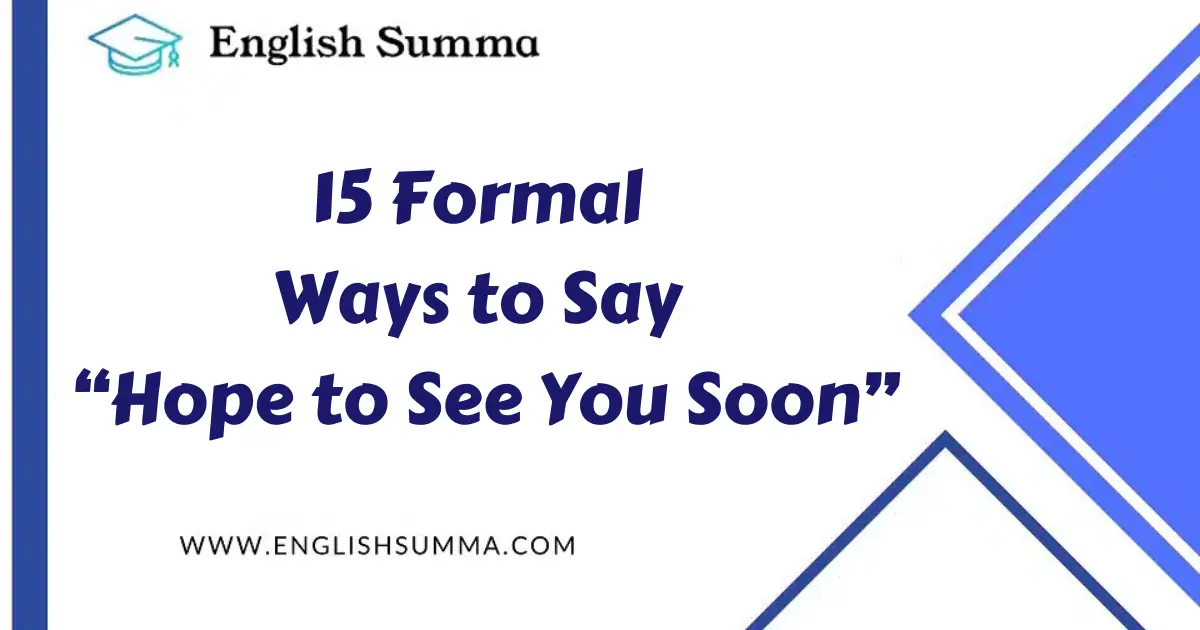In the realm of professional communication, expressing anticipation for future encounters goes beyond mere casual remarks. Mastering the art of formal expressions is essential, especially when conveying a sense of eagerness or hopefulness. Here are 15 refined ways to convey the sentiment “Hope to See You Soon,” accompanied by scenario examples for each.
1. Anticipating Our Next Encounter
Dear Mr. Taylor,
I trust this message finds you well. I am anticipating our next encounter with great enthusiasm. Your insights during our previous discussion were invaluable, and I eagerly look forward to the opportunity to delve deeper into our collaborative efforts. Please let me know a suitable time for our upcoming meeting.
Warm regards, James Wilson
Scenario: James, a project manager, expresses his eagerness to meet with Justin, a key stakeholder, to discuss further project collaboration and gain additional insights.
Additional Tip: Consider mentioning specific topics or agenda points to convey the purpose and importance of the upcoming meeting clearly.
2. Eagerly Awaiting Our Forthcoming Meeting
Dear Mr. Taylor,
I hope this message finds you in good spirits. I am writing to express that I am eagerly awaiting our forthcoming meeting. Your expertise is crucial to the success of our joint venture, and I am looking forward to our discussions that will undoubtedly contribute significantly to our shared goals.
Best regards, James Wilson
Scenario: James conveys his excitement about an upcoming meeting with Justin, emphasizing the importance of Justin’s expertise in their joint venture.
Additional Tip: Briefly highlight the significance of Justin’s contributions to build anticipation and appreciation.
3. I Am Hopeful for the Pleasure of Your Company in the Near Future
Dear Mr. Taylor,
Trusting this message finds you in good health. I am hopeful for the pleasure of your company in the near future. Your perspective is highly valued, and I believe our upcoming meeting will be an excellent opportunity to exchange ideas and align our strategies for the upcoming quarter.
Kind regards, James Wilson
Scenario: James expresses hope for Justin’s company in an upcoming meeting, emphasizing the value of their collaboration and the importance of aligning strategies for the future.
Additional Tip: Highlight shared goals and the mutual benefit of the upcoming meeting.
4. Counting Down the Days Until Our Next Meeting
Dear Mr. Taylor,
I trust this email finds you well. I find myself counting down the days until our next meeting. Our previous discussions have been insightful, and I am genuinely excited about the prospect of further collaboration. Please let me know if there are any specific points you would like to address during our upcoming rendezvous.
Sincerely, James Wilson
Scenario: James expresses his eagerness for the next meeting, indicating that he values Justin’s input and is eager to discuss specific points of interest.
Additional Tip: Mention specific details from previous discussions to reinforce the importance of the upcoming meeting.
5. Anxiously Anticipating Our Upcoming Rendezvous
Dear Mr. Taylor,
I hope this message finds you in good health. I am reaching out to express that I am anxiously anticipating our upcoming rendezvous. Your insights have been instrumental in shaping our strategies, and I am eager to discuss the next steps in our collaboration.
Warm regards, James Wilson
Scenario: James conveys a heightened sense of anticipation for the upcoming meeting, emphasizing the role of Justin’s insights in shaping future strategies.
Additional Tip: Express genuine appreciation for Justin’s contributions to build a positive and collaborative tone.
6. I Am Excited About the Prospect of Seeing You Soon
Dear Mr. Taylor,
I trust this message finds you well. I wanted to convey that I am excited about the prospect of seeing you soon. Our interactions have been both enlightening and productive, and I am looking forward to continuing our discussions.
Best regards, James Wilson
Scenario: James expresses his excitement about the prospect of meeting Justin soon, acknowledging the positive and productive nature of their previous interactions.
Additional Tip: Use positive language to convey enthusiasm and set a friendly tone.
7. I Eagerly Await the Opportunity to Meet With You Again
Dear Mr. Taylor,
I hope this message reaches you in good health. I eagerly await the opportunity to meet with you again. Your expertise is crucial to the success of our upcoming projects, and I believe our discussions will be instrumental in shaping our strategic direction.
Kind regards, James Wilson
Scenario: James emphasizes the importance of Justin’s expertise and expresses eagerness for a meeting to discuss upcoming projects.
Additional Tip: Mention specific projects or initiatives to provide context and emphasize the purpose of the upcoming meeting.
8. I Look Forward to Our Next Meeting With Great Anticipation
Dear Mr. Taylor,
Trusting this message finds you well. I look forward to our next meeting with great anticipation. The collaborative spirit in our previous discussions has been invigorating, and I am confident that our upcoming meeting will yield valuable insights for our ongoing projects.
Warm regards, James Wilson
Scenario: James conveys a high level of anticipation for the next meeting, highlighting the invigorating collaborative spirit of their previous discussions.
Additional Tip: Express confidence in the positive outcomes of the upcoming meeting to inspire a sense of shared purpose.
9. Hoping for the Chance to See You Again Soon
Dear Mr. Taylor,
I trust you are doing well. I am reaching out to express that I am hoping for the chance to see you again soon. Your input has been integral to our progress, and I believe our upcoming meeting will provide a valuable opportunity to further strengthen our collaboration.
Best regards, James Wilson
Scenario: James expresses hope for another meeting with Justin, emphasizing the importance of Justin’s input in their collaborative efforts.
Additional Tip: Use inclusive language to convey a sense of partnership and collaboration.
Don’t miss to read out Professional Ways to Say “No Worries”
10. Enthusiastically Awaiting Our Next Get-Together
Dear Mr. Taylor,
I hope this message finds you in good spirits. I am enthusiastically awaiting our next get-together. Our past discussions have been both enlightening and productive, and I am confident that our upcoming meeting will be equally impactful.
Sincerely, James Wilson
Scenario: James expresses enthusiasm for the next meeting, citing the positive and productive nature of their past discussions.
Additional Tip: Briefly mention specific outcomes or achievements from past meetings to build a narrative of progress.
11. I Am Optimistic About the Possibility of Our Paths Crossing Soon
Dear Mr. Taylor,
I trust this message finds you well. I am optimistic about the possibility of our paths crossing soon. Your insights have been instrumental in shaping our strategies, and I look forward to the opportunity to discuss our future endeavors.
Kind regards, James Wilson
Scenario: James expresses optimism about the possibility of meeting Justin soon, highlighting the instrumental role of Justin’s insights in shaping strategies.
Additional Tip: Express confidence in the mutual benefits of future collaborations.
12. Anxiously Looking Forward to Our Upcoming Reunion
Dear Mr. Taylor,
I hope this message reaches you in good health. I am writing to express that I am anxiously looking forward to our upcoming reunion. Your guidance has been invaluable, and I am eager to discuss the next phase of our collaborative efforts.
Warm regards, James Wilson
Scenario: James conveys a heightened sense of anticipation for an upcoming reunion with Justin, emphasizing the invaluable nature of Justin’s guidance.
Additional Tip: Express appreciation for specific instances of guidance to personalize the message.
13. Counting on the Pleasure of Your Company in the Near Future
Dear Mr. Taylor,
I trust this email finds you well. I am reaching out to convey that I am counting on the pleasure of your company in the near future. Your perspective is essential to our ongoing projects, and I am eager to discuss the next steps with you.
Best regards, James Wilson
Scenario: James emphasizes the essential nature of Justin’s perspective in ongoing projects and expresses eagerness for a meeting.
Additional Tip: Briefly mention the impact of Justin’s contributions on project outcomes.
14. I Anticipate the Pleasure of Seeing You Again Shortly
Dear Mr. Taylor,
Trusting this message finds you in good health. I anticipate the pleasure of seeing you again shortly. Our collaboration thus far has been enriching, and I am confident that our upcoming meeting will further strengthen our alignment on key initiatives.
Sincerely, James Wilson
Scenario: James expresses anticipation for seeing Justin again shortly, highlighting the enriching nature of their collaboration.
Additional Tip: Mention specific initiatives or projects to reinforce the collaborative focus of the upcoming meeting.
15. I Am Sincerely Looking Forward to Our Next Encounter
Dear Mr. Taylor,
I hope this email finds you well. I am sincerely looking forward to our next encounter. Your expertise has been invaluable, and I am eager to continue our discussions on how best to navigate the challenges and opportunities that lie ahead.
Warm regards, James Wilson
Scenario: James expresses sincere anticipation for the next encounter with Justin, acknowledging the value of Justin’s expertise in navigating future challenges.
Additional Tip: Use sincerity and authenticity to convey genuine excitement for the upcoming meeting.
Pros and Cons of Formal Expressions in Professional Communication
Pros:
- Professionalism: Formal expressions convey a high level of professionalism, creating a positive impression in business communication.
- Clarity: Well-structured formal expressions provide clarity, ensuring that the intended message is conveyed with precision.
- Respect: Formal language demonstrates respect for the recipient, acknowledging their expertise and contributions.
Cons:
- Perceived Formality: In some cases, excessive formality may be perceived as impersonal. It’s essential to strike a balance based on the nature of the relationship.
- Time-Consuming: Crafting formal messages can be time-consuming, especially when compared to more casual communication styles.
- Potential for Misinterpretation: Overly formal language may lead to misinterpretation if not tailored to the recipient’s communication preferences.

Meet Steven Smith, the driving force behind “English Summa.” Armed with a Bachelor’s Degree in Linguistics and a passion for teaching, Steven is dedicated to unraveling language intricacies for eager minds. Join him on a journey of linguistic discovery through Language Odyssey—a space where education meets inspiration, and the beauty of language unfolds.

